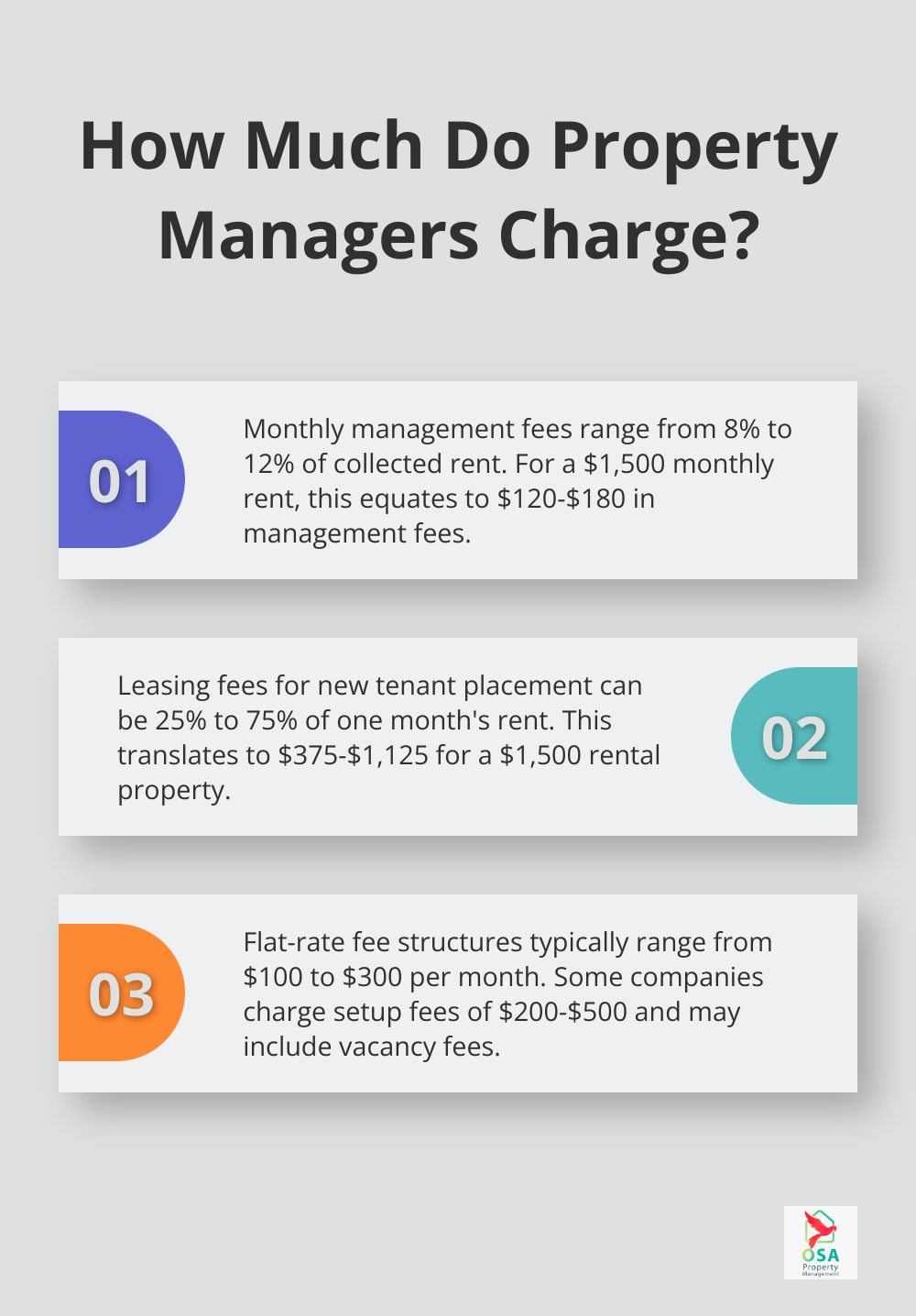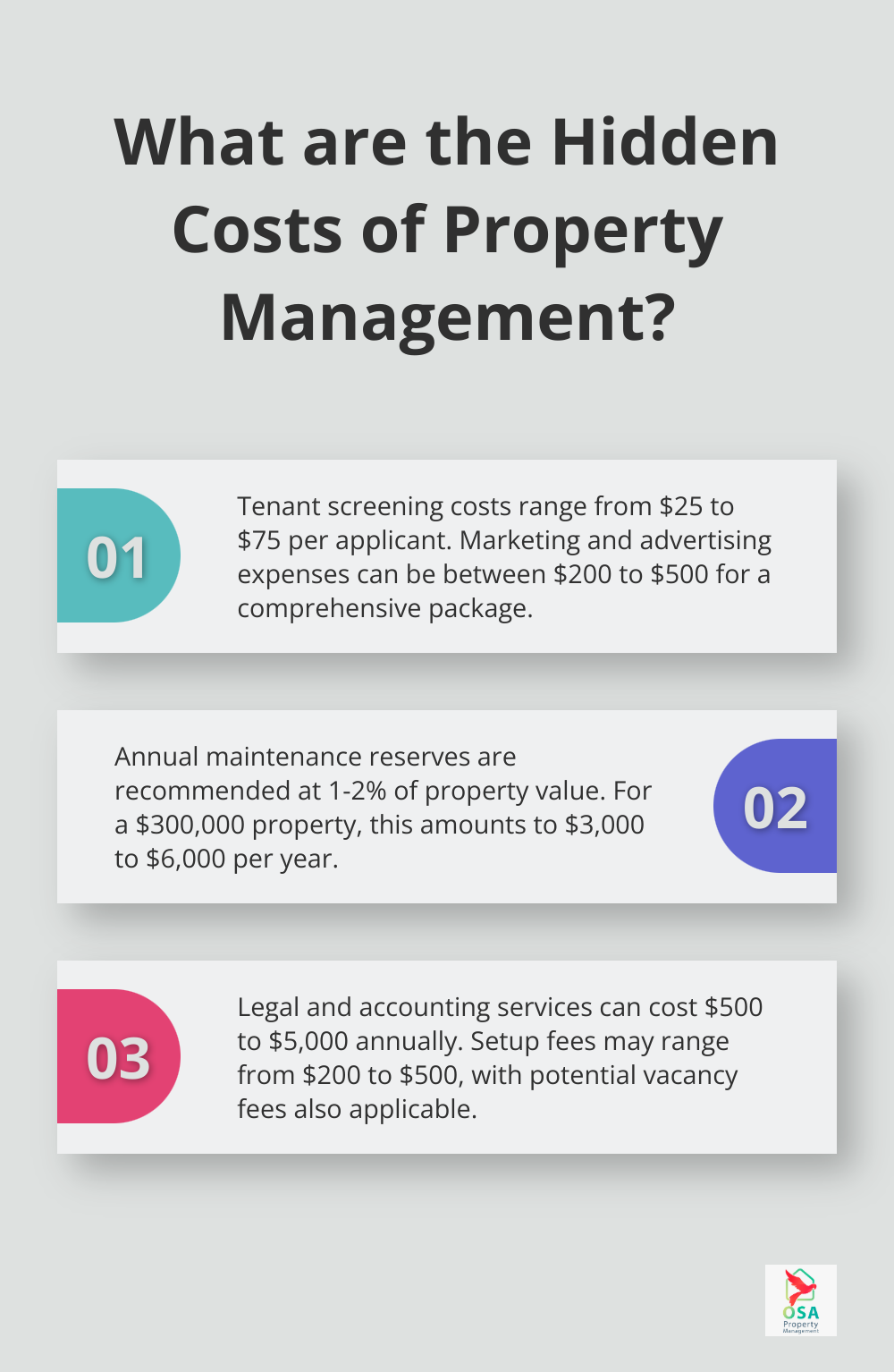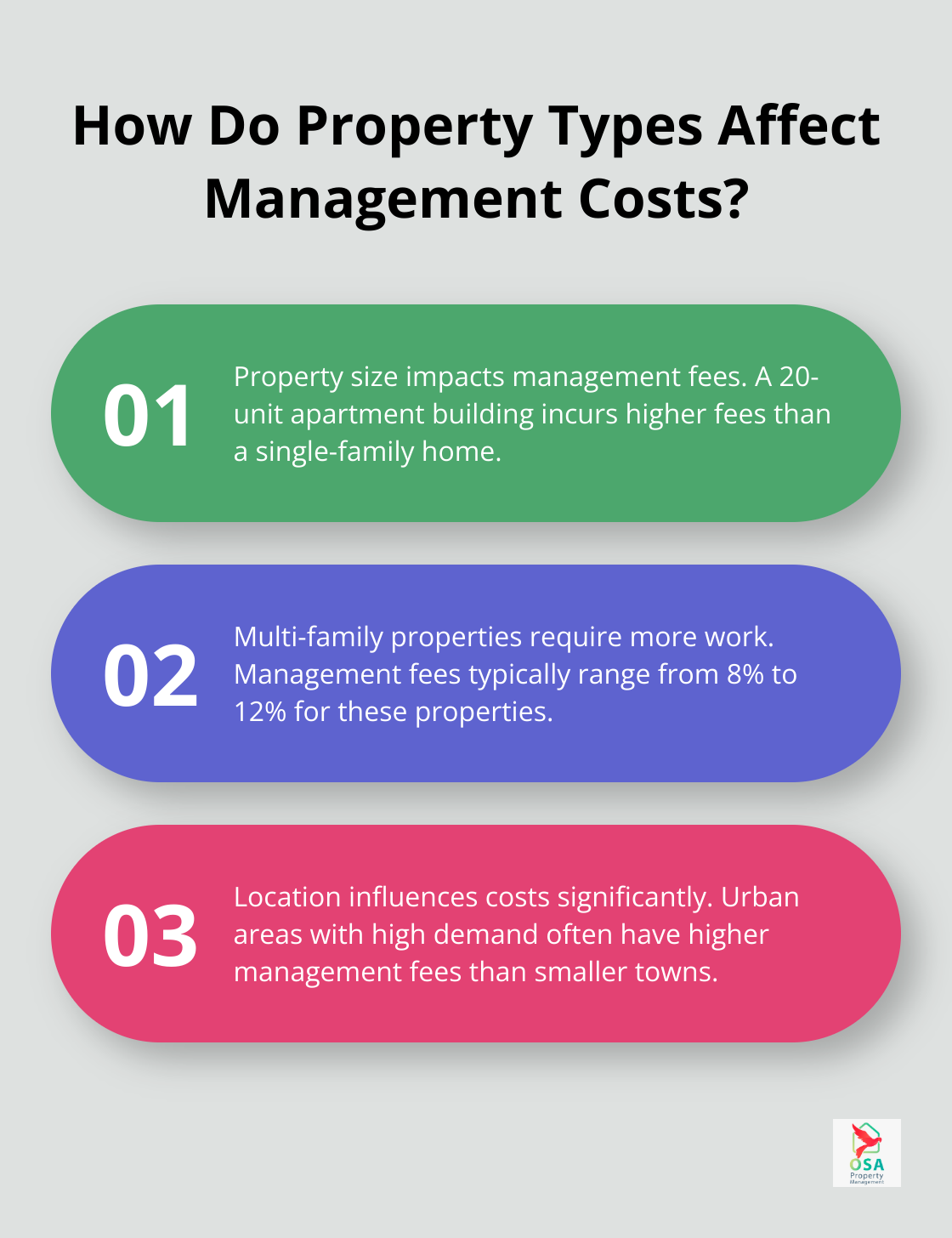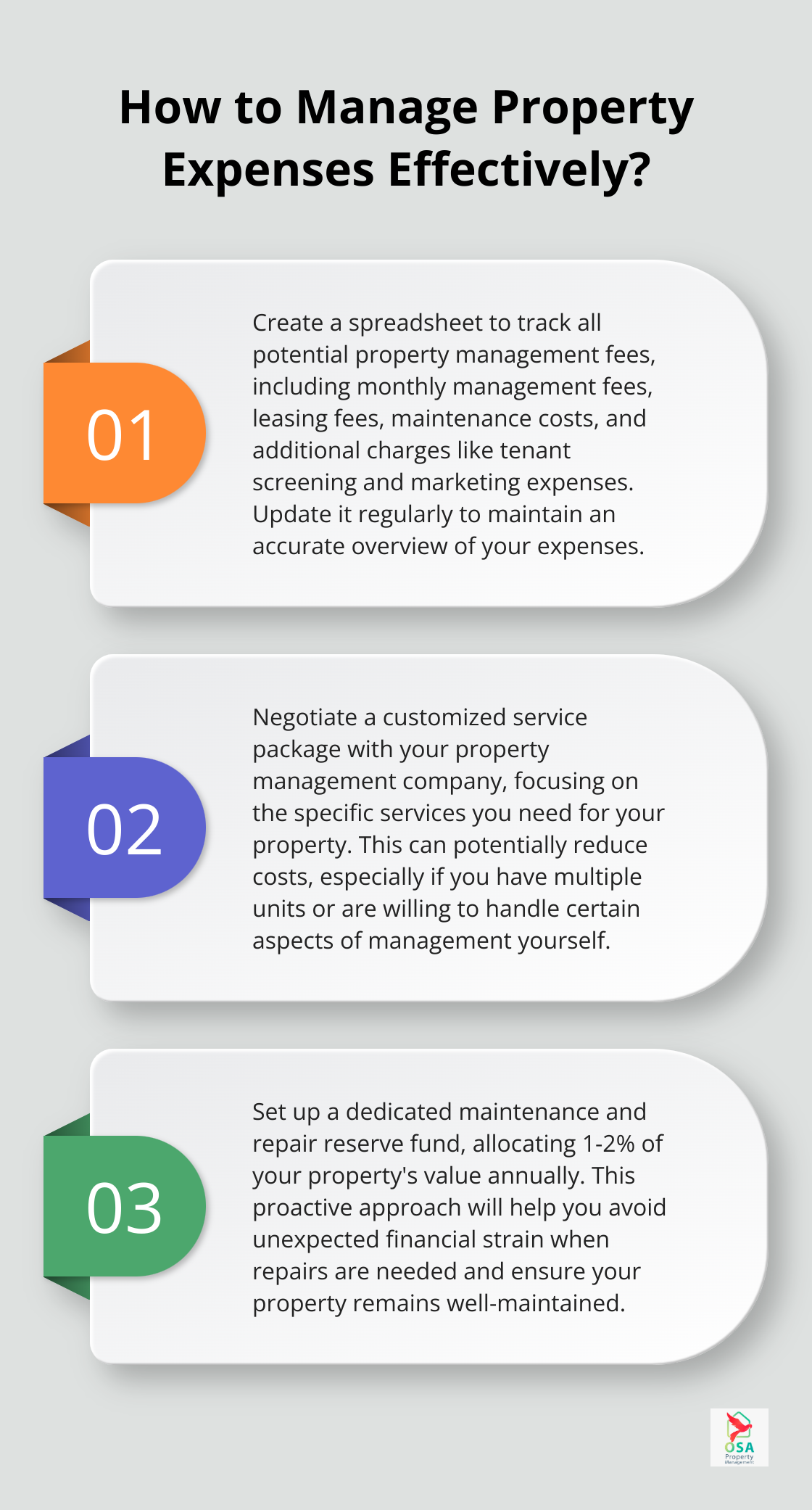At Osa Property Management, we understand that property owners often wonder about the costs associated with professional management services.
How much does rental property management cost? This question is crucial for landlords looking to maximize their investment returns while ensuring their properties are well-maintained.
In this post, we’ll break down the various fees and expenses involved in rental property management, helping you make an informed decision for your real estate portfolio.
What Are Typical Property Management Fees?
Monthly Management Fees
Most property management companies charge a monthly fee of between 8% – 12% of the monthly rent collected. For a property renting at $1,500 per month, this translates to $120 to $180 in management fees. Some companies offer customized service packages that may affect this percentage, potentially resulting in cost savings for property owners.
Leasing and Tenant Placement Fees
When a new tenant needs to be found, property managers often charge a substantial leasing fee. This fee may range between 25% and 75% of a month’s rent. For a $1,500 rental, you could face a one-time fee of $375 to $1,125. This fee covers essential services such as property marketing, tenant screening, and lease signing processes.
Maintenance and Repair Costs
While not a direct fee, maintenance and repair costs constitute an essential part of property management expenses. Many companies add a markup (typically around 10%) on maintenance services. Some property management firms employ in-house maintenance teams, which can sometimes lead to more competitive pricing for property owners.
Flat-Rate Fee Structures
Some property management companies offer flat-rate fee structures, which can benefit higher-end properties or those in areas with lower rent-to-property-value ratios. These fees often range from $100 to $300 per month, regardless of the rent amount. Flat-rate structures provide more predictable expenses for property owners, but it’s important to compare them carefully with percentage-based fees to ensure the best value.
Additional Fees to Consider
Property owners should be aware of potential extra charges. These may include setup fees (ranging from $200 to $500) and vacancy fees (which some companies charge even when the property isn’t generating income). It’s crucial to request a comprehensive list of all possible fees before signing with a management company.

As we move forward, let’s explore the additional costs that property owners should factor into their budgets when considering professional management services. These expenses can significantly impact the overall cost of property management and play a vital role in decision-making for landlords.
Hidden Costs of Property Management
Tenant Screening Expenses
Property management companies often charge for background checks, credit reports, and employment verification. These fees typically range from $25 to $75 per applicant. While it might seem cost-effective to skip this step, the expense of a problematic tenant can significantly exceed these upfront costs.
Marketing and Advertising Costs
Effective property marketing minimizes vacancy periods. Professional photography, virtual tours, and listings on popular rental websites can quickly accumulate costs. Some management companies include these services in their fees, while others charge separately. Property owners should budget between $200 to $500 for a comprehensive marketing package (depending on the property’s location and target market).
Maintenance and Repair Reserves
Prudent property owners allocate a portion of their rental income for maintenance and repairs. A common guideline suggests reserving 1-2% of the property’s value annually. For example, a $300,000 property would require $3,000 to $6,000 per year in reserves. This isn’t a direct fee to the property manager but represents a vital cost to include in the overall budget.
Legal and Accounting Services
Legal issues can arise even with excellent property management. Many property managers offer basic legal services, but complex situations may necessitate specialized attorneys. Proper accounting is also essential for tax purposes and financial planning. These services can cost between $500 to $5,000 annually (varying based on the complexity of the property portfolio and any legal challenges that occur).
Unexpected Fees
Property owners should be aware of potential extra charges. These may include setup fees (ranging from $200 to $500) and vacancy fees (which some companies charge even when the property doesn’t generate income). It’s important to request a comprehensive list of all possible fees before signing with a management company.

Understanding these additional costs allows property owners to prepare for the true expense of property management. The next section will explore the various factors that influence property management costs, with most companies charging between 8% and 12% of the monthly rent, providing a more comprehensive view of the financial aspects involved in professional property management.
What Drives Property Management Costs?
Property Type and Size
The type and size of a property directly influence management costs. Larger properties or those with multiple units require more time and resources to manage effectively. A 20-unit apartment building will generally incur higher management fees than a single-family home due to the increased workload and complexity.

Multi-family properties often come with additional responsibilities (such as common area maintenance, more frequent tenant turnover, and a higher volume of maintenance requests). These factors can push property management fees to the higher end of the 8% to 12% range that’s typical in the industry.
Location and Market Conditions
Geographic location significantly impacts property management costs. Urban areas with high demand often entail higher fees due to increased complexity and competition. For example, managing a property in San José, Costa Rica, may cost more than managing a similar property in a smaller town like Uvita.
Local market conditions also play a role. In areas with high demand for rentals, property managers may charge premium rates due to the increased workload of screening numerous applicants and handling frequent inquiries. In less competitive markets, fees might be lower to attract property owners.
Scope of Services
The range of services included in a management package greatly affects the overall cost. Basic packages typically cover rent collection, maintenance coordination, and tenant communication. More comprehensive packages might include additional services like:
- Regular property inspections
- Detailed financial reporting
- Tax preparation assistance
- 24/7 emergency maintenance response
Many property management companies offer customized service packages to ensure property owners only pay for the services they need. This approach can lead to significant cost savings, especially for owners who prefer a more hands-on role in certain aspects of property management.
Portfolio Size
The number of units a property owner has under management can influence the cost per unit. Many property management companies offer discounted rates for owners with multiple properties or units. This economy of scale can result in substantial savings for larger portfolios.
For example, while a single-unit owner might pay the full 10% management fee, an owner with 10 units might negotiate a reduced rate of 8% or even lower, depending on the total value and complexity of the portfolio.
Final Thoughts
Rental property management costs vary widely, influenced by factors such as property type, location, and required services. Property owners typically pay between 8% to 12% of their monthly rental income for comprehensive management services. Professional management can lead to higher-quality tenants, reduced vacancy rates, and more efficient property maintenance, often resulting in increased long-term profitability.

Choosing the right property management company is essential to maximize your investment. Look for companies with a proven track record, transparent fee structures, and a deep understanding of your local market. Don’t hesitate to ask for references and detailed breakdowns of all potential costs (including hidden fees).
Osa Property Management offers tailored solutions for property owners in Costa Rica. We provide comprehensive services including marketing, tenant relations, and financial management in areas like Tarcoles, Jaco, and Uvita. Our customized packages ensure you receive the exact level of support you need, balancing cost-efficiency with top-tier property management.

